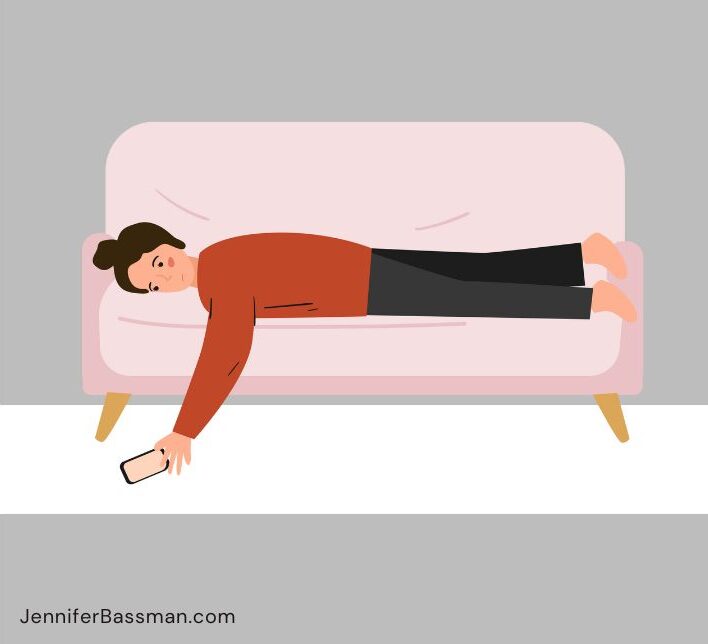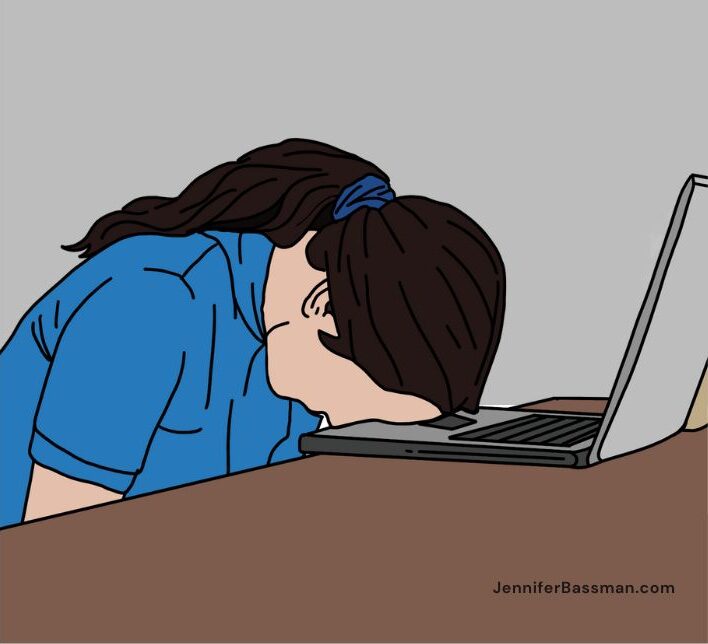I have been feeling like the laziest, unmotivated person alive lately.
I need to clean-up and reorganize my closet, but I just can’t seem to make myself do it.
There is a chair and ottoman in my bedroom that is stacked with (clean) clothes that I can’t put away because… there’s nowhere to put them until I clean out my closet and make room for them.
I want one of those beautifully organized closets that I see all over the internet.
You know the ones – they look like Marie Kondo personally did an overhaul. Everything is hung according to color and clothing type, stuff is neatly folded, and when you open any drawer, you can actually find what you’re looking for.
Spoiler alert: This isn’t laziness. It’s overwhelm. And I am willing to be I’m not alone.
Reframe Laziness and What Is Really Going On
If you’ve ever told yourself to just stop being lazy and get your act together, let me stop you right there.
What if the problem isn’t laziness at all? What if what’s actually holding you back is overwhelm, decision fatigue, and sheer exhaustion?
Somewhere along the way, we’ve been brainwashed into thinking that if we’re not hustling 24/7, we’re failing – or worse, lazy.
Laziness is a convenient label that society slaps on anyone who isn’t grinding away like a hamster on a wheel.
Every time we hit pause, that little voice whispers: ‘You’re so lazy.’ But what if that voice is dead wrong?
When we confuse exhaustion with laziness, we set ourselves up for guilt, shame, and a spiral of self-doubt.
Instead of asking, ‘What’s really going on?’ we blame ourselves for not doing more, achieving more, or being more.
You’re not lazy. You’re tired, overworked, and probably carrying a mental load the size of Texas. And guess what? That’s not a personal failing, it’s a sign that you need a break, not a lecture from your inner drill sergeant.
Laziness vs. Overwhelm – Which Battle Are Your Really Fighting?
When you’re overwhelmed, it’s easy to mistake yourself for being lazy.
The voice in your head might shout, “Why can’t I just stop being lazy and get this done?” But let’s get real — if being hard on yourself worked, you’d have solved this ages ago.
There is a world of difference between laziness and overwhelm:
Laziness is choosing not to do something.
Overwhelm is wanting to do everything but not knowing where to start or having the energy to even try.
Overwhelm looks like laziness because when your brain is overloaded with decisions, responsibilities, and stress, it short-circuits and keeps you from doing something. Suddenly, the smallest tasks feel impossible, and you’re left staring blankly at the wall, wondering why you can’t just ‘get it together.’
It’s not that you don’t care — it’s that you’re running on empty. Your body and mind are screaming for a break, and they’ll take it, whether you give them permission or not.
Ever sat down to check your email, only to realize two hours later you’ve accomplished nothing except opening 37 tabs and scrolling Instagram? That’s not laziness — it’s your brain waving a white flag.
When you’re overwhelmed, your brain’s executive function — the part that helps with decision-making and prioritization — essentially goes offline. This leaves you stuck in analysis paralysis or, worse, avoidance. (Hello, procrastination!)
Your stress response kicks in, flooding your body with cortisol and draining your energy reserves.
Overwhelm doesn’t just exhaust you physically — it drains you emotionally. It makes you feel like no matter how hard you try, it’ll never be enough. It’s easy to fall into a spiral of shame and self-criticism when, really, you’re doing the best you can under impossible circumstances.
It’s not your fault that the endless demands of life have piled up on you like a Jenga tower ready to collapse.
People love to say, ‘Just motivate yourself!’ as if that’s the magic cure for overwhelm. But here’s the truth: motivation doesn’t fix overwhelm. Rest does.
You can’t power through overwhelm any more than you can drive a car on an empty tank. Pushing harder won’t help — you need to refuel first.
You’re not lazy, and you’re not broken. You’re tired, you’re overstretched, and you’re human. So what’s the solution? It’s simpler than you think, and it starts with giving yourself permission to slow down.
Decision Fatigue Fuels Overwhelm
A major part of overwhelm is decision-making.
The average person makes 35,000 decisions a day. Our brains weren’t built to process this much choice. So, when it’s overloaded, even simple decisions can feel impossible.
Instead of acknowledging that you’ve hit decision fatigue, you tell yourself to stop being lazy and pick something.
Decision fatigue happens when the sheer number of choices we face depletes our mental energy. The more decisions you make, the harder each subsequent one becomes. When your brain is in overdrive from too many decisions, it’s not just tiring- it’s paralyzing.
An overwhelming number of decisions doesn’t just slow you down, it derails you. It leads to procrastination, impulsive choices, or just throwing in the towel and saying, ‘I’ll deal with it tomorrow. Maybe.’
It’s why you spend 20 minutes scrolling Netflix and still can’t pick a show. Or, why you settle for cereal or dinner after agonizing over your workday decisions.
Between work, family, and constant notifications, we’re bombarded with choices and decisions. Add in the pressure to make the ‘right’ decision every time, and it’s a recipe for overwhelm. (Yes, the worry about making a bad decision is a major drain on your energy and time.)
You can outsmart decision fatigue by simplifying your choices:
- Simplify Your Routine: Eliminate decisions by streamlining your day. Put as much of your day or routine on autopilot as possible with things like planning meals ahead of time or laying out clothes the night before.
- Prioritize Decisions: Save your mental energy for the big stuff by deciding what’s truly important to deal with each day. Use tools like to-do lists to focus on three key decisions.
- Limit Your Options: We all think we like having more options or choices… but we don’t. Stick to a few trusted options instead of overwhelming yourself with endless possibilities.
- Set Boundaries on Choices: Not every decision requires your input. Delegate when you can and embrace pre-set options for small things – like sticking to your favorite take-out order instead of scrolling the menu for 30 minutes.
8 Ways to Get Out of the Overwhelm Spiral
The good news? You’re not stuck. Overwhelm isn’t a permanent state — it’s a signal that something needs to change.
This isn’t about fixing yourself because you’re not broken. It’s about learning how to protect your time, energy, and sanity in a world that demands too much.
The next time you catch yourself thinking, ‘I need to stop being lazy,’ instead ask yourself: ‘What’s one small step that I can take to feel less overwhelmed?’
When you’re drowning in tasks, it’s tempting to want to fix everything at once. But here’s the secret: small, manageable steps are what lead to bigger, sustainable changes.
Think of your energy like a bank account. Every task, interaction, and decision is a withdrawal. If you don’t make regular deposits – through rest and boundaries – you’ll hit overdraft fast. So, if you are constantly feeling exhausted and running on fumes, it’s because your bank balance is low.
Here are eight ideas of quick ways to manage your overwhelm: (You don’t need to do or try all of them!)
- Start Small: Instead of tackling your entire to-do list, pick one thing – a single email, one corner of a messy countertop.
- Identify Your Energy Drains: You can’t fix what you don’t acknowledge. Take a moment to reflect on what tasks, people, or situations leave you feeling wiped out. Are there recurring patterns or specific moments that drain you?
- Practice Energy Budgeting: Just like you budget money, you can budget your energy. Ask yourself what’s worth your time and effort today? What can wait? Or what doesn’t need to happen at all?
- Learn to Say No (Without Guilt): Saying no feels impossible when you’ve been conditioned to please others. But every time you say yes to something you don’t want to do; you are saying no to yourself.
- Prioritize Rest and Recovery: Rest isn’t lazy – it’s essential maintenance. Even 10 minutes of doing absolutely nothing can help reset your overwhelmed brain.
- Create Breathing Room in Your Schedule: You don’t have to fill every second of your day to be productive. In fact, leaving blank space in your schedule gives you room to breathe – and think. Block out ‘white space’ on your calendar every week. Use this time to rest, read, or just stare out the window.
- Prioritize What Recharges You: Think about the last time you felt truly energized and at peace. Whatever created that feeling – do more of that.
- Ask for Help (and Accept It): Asking for help doesn’t make you weak or signal weakness. It makes you resourceful. No one expects you to get through life alone, so stop expecting that from yourself. Think of it this way – when was the last time you got mad at a friend who needed help that asked you for it?
Now, go take a break and don’t you dare feel bad about it.






